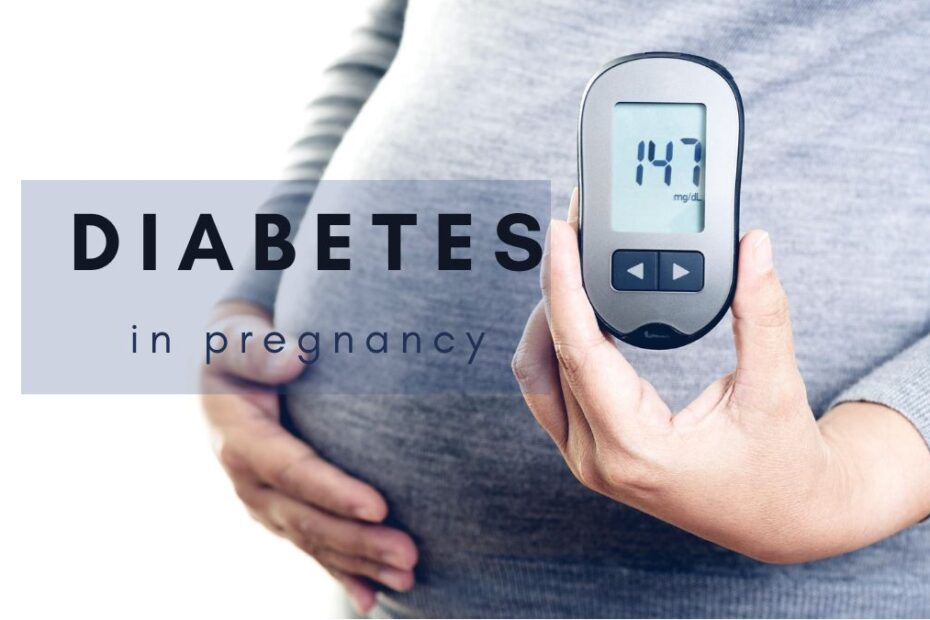Prevention of Gestational Diabetes
Risk of Gestational Diabetes can be lowered by:
- Eating a healthy diet, which includes lots of vegetables, whole grains, fruits, and protein
- Staying active
- Losing extra weight
Effects of Gestational Diabetes on Pregnancy:
1.On the mother:
Women with gestational diabetes are :
1.more likely to develop Type 2 diabetes in later life
2.more likely to have gestational diabetes with another pregnancy.
3. more likely to develop Preeclampsia.Women with Type 1 or Type 2 diabetes are at increased risk for developing preeclampsia (increased blood pressure) during pregnancy. To lower the risk, low-dose aspirin (60 to150 mg a day) is advised from the end of the first trimester until the baby is born .
- On the foetus:
Possible complications for the baby include:
- Birth defects. Birth defects are more likely in babies of diabetic mothers.
Birth defects usually occur in the first trimester of pregnancy.
Babies of diabetic mothers may have major birth defects in the heart and blood vessels, brain and spine, urinary system and kidneys, and digestive system and some serious defects may result in stillbirth.
- Stillbirth (foetal death). Stillbirth is more likely in pregnant women with diabetes.
The baby may grow slowly in the uterus due to poor circulation or other associated conditions, such as high blood pressure or damaged small blood vessels.
The exact reason stillbirths happen with diabetes is not known.
The risk of stillbirth increases in women with poor blood glucose control and with blood vessel changes.
- Means” a baby that is much larger than normal”.
If the mother’s blood has excess sugar, the pancreas of the baby makes more insulin to use this glucose. This causes fat to form and the baby grows bigger than normal.
- Birth injury.Birth injury may occur due to the baby’s large size and difficulty during delivery.
- The baby may have low blood glucose levels immediately after delivery.
This problem occurs if the mother’s blood glucose levels have been high for a long time.
After delivery, the baby continues to have a high insulin level, but no longer has the glucose from the mother. This causes the new born baby’s blood glucose level to drop very low.
The baby’s blood glucose level is checked after birth. If the level is too low, the baby may need glucose supplementation.
- Trouble breathing (respiratory distress).Too much insulin or too much glucose in a baby’s system may keep the lungs from growing fully. This can cause breathing problems in babies. This is more likely in babies born before 37 weeks of pregnancy.
Monitoring during pregnancy:
Special testing and monitoring of the baby may be needed for pregnant diabetics, especially those who are taking insulin. This is because of the increased risk for stillbirth. These tests may include:
1.Foetal movement counting. This means counting the number of movements or kicks in a certain period of time, and watching for a change in activity. This is also called as DFKC ( Daily Foetal Kick Count)
2.Ultrasound. This is done at specified intervals to monitor the baby growth, baby weight, amount of amniotic fluid and blood flow to the foetus.
3.Nonstress testing. This is a test that measured the baby’s heart rate in response to movements.
4.Biophysical profile. This is a measure that combines tests such as the nonstress test and ultrasound to check the baby’s movements, heart rate, and amniotic fluid.
5.Doppler flow studies. This is a type of ultrasound that measures blood flow.
If you have gestational diabetes you should get tested a few months after your baby is born and every 3 years after that.
Prevention of Gestational Diabetes
Risk of Gestational Diabetes can be lowered by:
- Eating a healthy diet, which includes lots of vegetables, whole grains, fruits, and protein
- Staying active
- Losing extra weight
Treatment of Gestational Diabetes


If you are diagnosed with gestational diabetes, you’ll need treatment as soon as possible to keep yourself and your baby healthy during your pregnancy and delivery. You are asked to:
- Check your blood sugar levels four or more times a day
- Check your urine for ketone bodies (chemicals that mean that your diabetes isn’t under control)
- Eat a healthy diet
- Make exercise a regular habit
Track of your weight and your baby’s development is maintained.
You might be given insulin or another medicine to keep your blood sugar under control.
